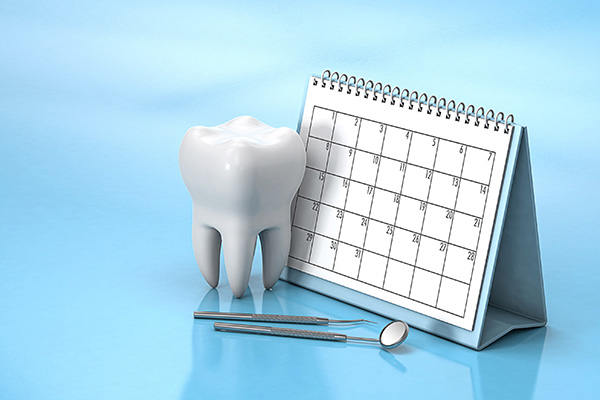When Would a Dentist Recommend a Deep Teeth Cleaning?

If you are overdue for a deep teeth cleaning or have periodontal disease, you may benefit from an in-depth dental cleaning. Officially known as root scaling and planing, deep cleanings are a more extensive form of deep teeth cleaning. It involves removing tartar and plaque from gum pockets and teeth roots. Dental cleanings serve mainly as preventative treatments to protect teeth from decay and gum disease, while deep cleanings treat gum disease.
Reasons a dentist might recommend deep teeth cleaning
Deep cleaning teeth typically involves administering a shot of a local anesthetic at the start of the treatment. This anesthetic numbs the patient’s gum tissues so they do not feel pain as the dentist treats them. The dentist will typically break the treatment into multiple steps to minimize the pain and discomfort the patient experiences as they recover.
During a deep cleaning, gum tissues are pulled back so the dentist can clean teeth roots and gum pockets. Tartar and plaque are removed from these areas, and medication might be inserted into gum pockets. The dentist then polishes the patient’s teeth roots before reattaching gum tissues to them. The polish makes it harder for tartar deposits to build up on teeth roots and makes it easier to reattach gum tissues.
Some of the reasons a dentist might recommend getting deep teeth cleaning include the following:
1. As a treatment for gingivitis
Gum disease occurs in two stages, and the first is called gingivitis. Symptoms of the early stage of gum disease include receding gums, purplish gums, or tender gum tissues. Gingivitis can be reversed by improving oral hygiene and regular teeth cleanings. However, root scaling and planing might be recommended depending on how far a patient’s gingivitis has progressed or if the dentist doubts their patient’s commitment to oral hygiene.
2. To manage periodontitis
Periodontitis is the second stage of gum disease and is the leading cause of tooth loss in adults. It is a chronic gum tissue infection linked to health issues like heart disease and diabetes. Chronic infection damages gums and bone tissues in the mouth and can lead to inflammation in other body parts. Periodontitis cannot be reversed, but it can be managed with treatments like deep teeth cleaning. In addition, removing tartar deposits from gum pockets and teeth roots helps to slow down the infection.
Other treatments that can be used to help manage periodontitis include bone grafts, gum grafts, and implants.
Bone grafts
During a bone graft procedure, bone is taken from one part of the body and transferred to another. Bone grafts are used in a variety of ways, including:
To repair a defect in the jaw or skull. A bone graft can be used to fill in a hole left by an extraction site or other dental procedure.
To repair damage caused by traumatic injury or congenital defects such as cleft palate. Bone grafts may also be used to help stabilize certain facial bones after trauma or birth defects
As part of a reconstructive procedure for conditions such as osteoporosis, Paget’s disease, and cancer patients undergoing radiation therapy. Bone grafts are particularly useful for stabilizing jawbones affected by these conditions
A bone graft is typically taken from the patient’s body (autograft) or a donor (allograft). Autografts are generally preferred because they have less risk of infection than autografts and result in fewer complications over time.
Gum grafts
Gum grafting is a procedure used to treat receding gums. It involves replacing lost gum tissue with donor tissue from another part of the mouth or even another person. The goal of gum grafting is to prevent further recession and the loss of teeth. A patient with gum recession can receive pain, sensitivity, and even tooth loss if receding gums are not treated.
The dentist may recommend a gum graft for patients who have lost a significant amount of bone support under their gums and wish to maintain their natural smile without resorting to dentures.
Dental implants
Dental implants are artificial roots that are placed into the jawbone where there are missing teeth. The implants act as anchors for replacement teeth, known as crowns, which look and function like natural teeth. The dentist can use oral prosthetics like dental implants to replace teeth lost due to periodontal disease.
Get treatment for gum disease
Treatments like deep teeth cleaning can help to bring the periodontal disease under control. Give us a call or stop by our Dallas office to set up an appointment with our dentist.
Request an appointment here: https://cosmeticdentistdallastx.com or call Lalangas Family Dentistry at (972) 534-6008 for an appointment in our Dallas office.
Check out what others are saying about our dental services on Yelp: Deep Teeth Cleaning in Dallas, TX.
Related Posts
It is a known fact that routine dental cleaning is an important part of oral health. The American Dental Association recommends that people with an overall healthy mouth visit a dentist for a regular checkup and cleaning once every six months. Those with specific dental issues or certain underlying health conditions may need to schedule…
Going in for a dental checkup might not be at the top of your priority list, but it should be. There could be many reasons why you have not been to the dentist’s office for a year or longer. Life can get busy, or you may have fears or anxieties about these visits. Whatever has…
Looking for information on preventive dentistry? Read on to learn more. A good preventive dentist can save you money on significant tooth problems, pain, and costly treatments in the future. All treatments or procedures that prevent tooth decay, tooth damage, and gum disease fall under preventive dentistry. Fortunately, when preventive dentistry is incorporated into daily…
Seeing a preventive dentist can help keep your teeth and gums healthy. Prevention is always better than extensive treatments, especially when it comes to dental health. This provider can perform treatments that can keep dental problems at bay. Here are some of the benefits that you can enjoy from visiting a preventive dentist for regular…


